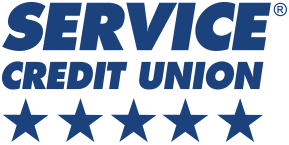7 Tips to Rebuild Financial Health After a Long Period of Unemployment

The following is a contributed post by LendingTree and does not reflect advice from Service Credit Union.
Going without work for any length of time can be stressful, but those facing long-term unemployment are likely feeling the financial strain. If you’re in this boat, take heart in knowing you aren’t alone. As of February 2023, 1.1 million people had been out of work for 27 weeks or more, according to the U.S. Bureau of Labor Statistics.
If you’ve spent a long time without income, you may have accumulated unwelcome debt or pushed off some bills, so once you land a new job, your first order of business should be rehabbing your finances. Here are seven tips to help rebuild your financial health after a long stint of unemployment.
1. Review your credit score
Your credit score is the foundation of your financial health. This number, which ranges from 300 to 850, tells lenders how responsible you are when it comes to managing credit; an important detail when you’re applying for a mortgage, auto loan, credit card or any other type of credit account. A higher score generally makes you a more attractive borrower and opens the door for lower interest rates and better borrowing terms.
Understanding the factors that affect your credit score can help you be intentional about improving it. Hands down, the most important one is paying your bills on time because it makes up 35% of your FICO Score. Keeping your open balances low relative to your credit limit is another biggie. This is known as your credit utilization ratio and accounts for a third of your score. The goal is to keep your balances at or below 30% of your credit line. Exceeding this amount can drag down your credit score.
2. Prioritize debt
If you’ve racked up some debt due to long-term unemployment, begin by jotting down all your open account balances and interest rates. Prioritizing high-interest debt, which tends to be credit card debt, can be a good action plan because it’s costing you the most money. One option is to continue making your minimum payments across all of your accounts, while throwing any extra income at your balance with the highest interest rate until it’s paid off. After that, you move on to the one with the next highest rate — a strategy called the avalanche method.
Another option, known as the debt snowball approach, involves chipping away at your lowest balances instead. Alternatively, you might be able to pay off your debt faster by consolidating it with a lower-interest personal loan. Refinancing other costly debt, like student loans, may be worth exploring as well.
3. Replenish cash reserves
Your savings account is usually the first thing to take a hit when you’re unemployed. This isn’t necessarily a bad thing — that’s what it’s there for, after all. Once your income begins to pick up again, you can focus on replenishing those cash reserves. Experts recommend socking away three to six months’ worth of expenses that you can easily access when faced with an emergency, whether that’s another round of unemployment or an unexpected car repair. A high-yield online savings account is a great place to park your emergency fund.
Just keep in mind that rebuilding your savings won’t happen overnight. Be patient while earmarking some portion of your monthly income for this goal, even if you start small. Another hack is to direct cash windfalls, like your next tax refund, directly into your savings account.
4. Recalibrate your retirement savings
If you’ve been out of work for an extended period of time, chances are your retirement contributions were put on hold. Once your income has stabilized, make a plan for catching up. Fidelity recommends saving 15% of your income annually, but it’s OK to treat this like a loose benchmark — no need to panic if you’re behind this target. At the end of the day, ramping up your savings rate after a period of unemployment really comes down to starting where you are.
If your new job offers a 401(k) with a match, take advantage and set up automatic contributions from your paycheck. (The match is essentially free money.) Freelancers and self-employed folks can explore investment vehicles like Traditional and Roth IRAs, which are other tax-friendly ways to set aside money for retirement.
5. Update your budget
A budget is nothing more than a spending plan that’s based on your current income and expenses. If you’re spending more than you’re earning, it’s time to tighten things up. Look to any unnecessary bills you can cut, like memberships or subscriptions you can temporarily live without. If you’re running an extreme deficit, you may have to consider downsizing or taking on a roommate to offset your spending.
Income makes up the other side of a budget. If you’re collecting unemployment benefits, you can base your budget on that. (Just bear in mind that you will need to pay taxes on this income down the road.) If you’ve secured a new job, use your new take-home pay as your base. Either way, you’ll want to account for three main spending categories — essential expenses, discretionary spending and saving for financial goals, whatever those may be.
6. Revisit your financial goals
Speaking of financial goals, yours may have changed while unemployed. Take stock of where you are and ask yourself what you really want in both the short and long term. Maybe rebuilding your emergency fund feels most pressing. Others may want to focus more on paying down debt or saving for a down payment for a home. Have more than one goal? That’s perfectly fine — it’s possible to contribute a little bit to multiple savings buckets at once.
Determine how much you need to save overall, then back into that number on a monthly basis. In other words, if you want to have $10,000 in your savings account in one year’s time, how much do you need to set aside from each paycheck to make that happen? Take one step at a time to make it feel more attainable.
7. Stay active with your professional network
One 2022 ERE Media study found that employee referrals are the No. 1 source of new hires. This underscores just how important it is to maintain an active professional network — these are the people you’ll need to call on should you experience another bout of unemployment. Having the right contacts can help you learn about new opportunities and give you a leg up over the competition.
Keep these relationships fresh by attending networking events (even virtual ones) and staying active within your industry so that you always have one ear on the ground. And always add value when you can. This means helping out others if you’re in a position to do so. Remember, professional networking is a two-way street.
Interested in a career at Service Credit Union? Learn more.




